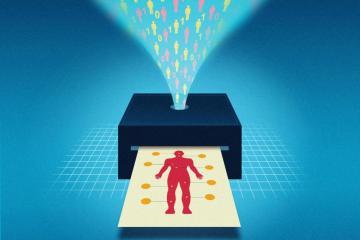
October 24th 2025

How Computer Analytics Offers Medicine Better Answers

IBM's Watson is working with cancer centers to create treatment plans for patients battling different tumor types.
In an era of genomics and big data, medicine is getting to be as much about computer analytics as it is about listening to patients' complaints and asking them to say "ah." Imagine a day when your oncologist can sequence your genes and pinpoint the treatment most likely to save your life based on your genetic makeup – in minutes, with just a few clicks.
That's the goal of Watson for Genomics, a technology launched by IBM in 2014 to capitalize on the data processing power of Watson, the computer that famously won "Jeopardy!" in 2011 (and whose $77,147 in prize winnings went to charity).
More than 20 cancer centers are now collaborating with IBM to collect DNA data from patients and then use a new cloud-based software program based on Watson's wisdom to personalize treatment plans for patients battling lymphoma, melanoma, ovarian cancer and many other tumor types. The computer processes all sorts of data from patient records to doctor's notes and millions of pages of medical literature – at a rate of 800 million pages per second – and learns the material as it goes. It then produces information about potential treatments based on individual patients' DNA profiles.
Such technology is aimed at simplifying what has been a cumbersome and time-consuming process. In cancer, for example, it's now possible to analyze and test up to 500 genes for inherited cancer risks and other mutations that may guide treatment choices, says Jennifer Klemp, director of cancer survivorship at the University of Kansas Medical Center, one of IBM's partners. "The problem is, what do we do with the information? Figuring out how to apply it can be overwhelming for providers," she says.
Several companies are developing tools that can come to physicians' aid in improving the prognosis for each patient. Besides IBM, the players include Craig Venter, one of the first scientists to sequence the human genome, whose San Diego-based firm Human Longevity is partnering with pharmaceutical companies to look for links between genes and several diseases.
And in June, Vice President Joe Biden, who is heading up President Barack Obama's cancer "moonshot" initiative, announced that the National Cancer Institute would launch an open-access database containing anonymous genomic and clinical data from 12,000 patients that any scientist or doctor can tap into for insights on the molecular makeup of many cancer types.
IBM has been expanding Watson's role in oncology. In 2012, the company teamed up with Memorial Sloan Kettering Cancer Center in New York to develop software that suggests treatment regimens based on scientific evidence and the prior experiences of other MSK patients. That product is now being rolled out to other cancer centers. And in April, the American Cancer Society teamed up with IBM to work on deploying Watson as a navigator for individual patients, providing tips on how best to manage their care given their particular diagnosis and the information they feed back to Watson about their race, income, location and other factors.
Data show that people in low-income areas tend not to adhere to their drug regimens, for example, says Richard Wender, chief cancer control officer at the American Cancer Society. With Watson's help, "we'll be able to identify features that put people at high risk," he says, and from the moment of diagnosis offer them guidance that has been useful to similar patients in the past. IBM has also formed a partnership with the U.S. Department of Veterans Affairs, which will tap Watson to provide personalized care to 10,000 veterans with cancer.
It's not just oncologists and cancer patients who stand to benefit from big data. Watson is also being tapped to create apps to assist people recovering from joint surgery and tools that patients can use to control their diabetes, for example. In January, IBM and medical device-maker Medtronic debuted a smartphone app prototype that can flag impending trouble for people with diabetes up to three hours before the patients themselves would realize that something is wrong. By analyzing data from 10,000 people who use Medtronic's insulin pumps and glucose monitors, Watson figured out how to predict a dangerously low blood glucose level in plenty of time to help prevent it. The app will roll out later this year.




